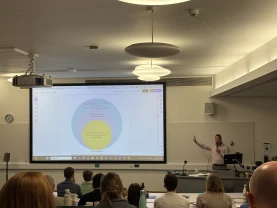Blog
Stalking & Harassment – How police can meet the changes and actions required
With the 22nd November deadline fast approaching, we discussed strategies and the way forward with key experts in the VAWG space.

Gavin Moffat
Related content

The Forensic Science Regulator's Code of Practice 2023
What does regulation of working with communications and cell site data mean for me and my organisation?
We were delighted to host an insightful webinar in November with three experts in the field of VAWG exploring crucial areas of improvement that have been identified by the IOPC regarding stalking and harassment cases. We were joined by:
Giles Herdale - VAWG Digital Strategy Lead, NPCC
Tina Wallace - Detective Inspector, Thames Valley Police
Clare Moody - Police and Crime Commissioner, Avon and Somerset Police
In response to a super-complaint submitted by the Suzy Lamplugh Trust in 2022 on behalf of the National Stalking Consortium, an investigation was conducted and a joint response published in September 2024 by the Independent Office for Police Conduct (IOPC), along with His Majesty’s Inspectorate of Constabulary and Fire and Rescue Service (HMICFRS), and the College of Policing.
The investigation highlighted how urgent reforms were needed throughout policing, which in summary were: better officer training, clearer guidance on applying preventative measures, and the use of “digital witnesses” to provide objective, irrefutable evidence. Additionally, the HMICFRS report laid out a list of time-bound actions Chief Constables are required to address by 22nd November 2024, and 27th March 2025.
With the first deadline rapidly approaching our expert panel discussed the challenges faced by police forces to implement these recommendations and shared valuable insights on best practise to achieve the requirements.
Chief Constable Maggie Blyth NPCC Lead on VAWTG declared VAWG a national threat to public safety and that it should be ‘treated on par with terrorism and serious organised crime.’
Panellist Tina Wallace emphasised the importance of early intervention and a more proactive approach to tackling these sorts of offences to reduce offending, such as those used in Project Vigilant. Project Vigilant targets predatory behaviour in the night -time economy and has proven that this sort of methodology can both prevent future offences and offenders behaviour escalating. Tina discussed the challenges faced with this proactive approach, particularly those regarding the current legislation.
Giles Herdale spoke about how technology has transformed all crime but specifically how it is being abused in stalking and harassment cases, making it easier for offenders to track their victims, often without them being aware. Ironically it is also technology and identifying digital data streams which has been highlighted as a key recommendation to improving stalking and harassment investigations. Focusing on identifying new leads through digital and data driven investigations not only helps to safeguard victims but also increases convictions. Digital technology also provides court-worthy evidence which reduces the burden on the victim to remember and report each incident.
Methodology like Operation Atlas using in the Metropolitan Police Service has demonstrated how using a data informed and victim centred approach has increased convictions rates, shortened case resolution times and increased guilty pleas through the presentation of irrefutable evidence that digital data offers.
Claire Moody highlighted how although this is a critical issue for the criminal justice sector VAWG is a wider societal issue with the impact affecting public perception of the judicial system.
The combination of the 3 experts sharing their individual expertise and knowledge provided great value that will encourage further conversations beyond just this discussion providing support and actionable takeaways for constabularies across the country to ensure they can meet the requirements from the report.
Forensic Analytics looks forward to continuing this conversation and hearing more on the progress of each constabulary early next year.
You can access the full recording of the webinar here.
To find out more about Forensic Analytics and our approach in the VAWG space, contact us.
